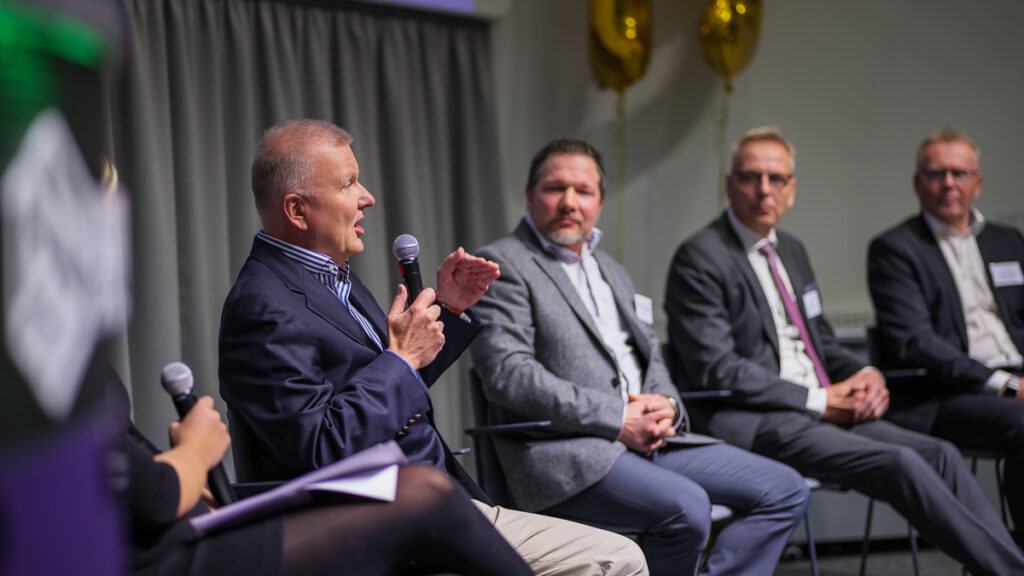The EU’s new battery regulation provides battery producers with the opportunity to stand out from their competitors through sustainability. Funding for projects that support the regulation’s objectives is already available.
The battery regulation has significant impacts not only on batteries but also on their producers, including manufacturers and importers. Celltech’s Managing Director, Anders Blomqvist, Veho’s Training Manager, Antti Paasivirta, the Technical Trade Association’s Chief Expert, Juha Ala-Hiiro, and Business Finland’s Program Director, Ilkka Homanen, participated in the battery seminar’s discussion on the topic.
According to the participants in the discussion, the purpose of the battery regulation is a good one, even though it increases obligations and costs. For instance, the expansion of producer responsibility, the increase in labelling requirements, and the rise in recycling costs will affect battery producers in the near future.
Anders Blomqvist from Celltech, however, emphasises the importance of the regulation in streamlining the industry and enhancing battery safety.
“In the long run, this is a positive development, even though the workload increases now. By investing in due diligence requirements, one can gain a competitive advantage but it’s a substantial process,” Blomqvist reflects.
There will also be plenty of work in complying with the growing recycling and recovery obligations. For instance, a producer organisation would be required for large industrial lithium batteries, as Blomqvist points out.
“Previously, the recycling of industrial batteries could be arranged on a case-by-case basis, but the regulation now obligates producers to maintain a collection system and include recycling costs in the battery’s price. This is a significant change across all of Europe.”

The shortage of skills threatens several industries
Finland’s car pool is rapidly electrifying. Already, every third new passenger car is fully electric, which increases the demand for electric car mechanics. In the future, automotive repair shops will need to consider how electrical work is carried out and monitored, says Antti Paasivirta, Training Manager at Veho.
“Meeting the requirements of the battery regulation may require significant investments from repair shops. On the other hand, the development of power sources is so rapid that we don’t even know what kind of expertise will be needed ten years from now.”
The same skills shortage also threatens other industries. In addition to personal transportation, agricultural and industrial machinery are also electrifying and becoming more digital, which increases the need for batteries and battery experts.
The development of industrial machinery can be compared to heavy transportation: alongside full electric solutions, other power sources and multi-engine solutions are being explored, says Juha Ala-Hiiro.
“In Finland, we already have a hydrogen forklift in use, and various battery-based solutions. For example, a backhoe loader can work for 2 hours on electricity, after which charge the batteries with an internal combustion engine in 40 minutes, and then continue working. This reduces carbon emissions by up to 90 percent.”
Business Finland supports development work related to the battery regulation
A significant amount of development work has already been done to meet the requirements of the battery regulation, but this work must continue. Funding for innovation projects is available from Business Finland. Ilkka Homanen, Program Director for the Hydrogen and Battery Industry, acknowledges that meeting the requirements of the battery regulation involves a lot of initial work for producers, legislators, and financiers.
However, the effort is worthwhile. Homanen says that the regulation offers producers an excellent opportunity to incorporate Finnish circular economy thinking and innovations into the low-carbon transition, which is expected to bring significant growth and export opportunities for Finland.
“Finland is a highly attractive investment destination. A small and innovative country with tight networks, excellent service orientation – we have a good foundation for building the battery value chain.”
Overall, the investment amounts in the industry are substantial. Dozens of new cell factories will be established in Europe. Homanen suggests that there are many aspects in the battery regulation’s requirements where Finnish expertise could be utilised.
“Traceability in battery manufacturing and the digitalisation of battery passports are such challenges. There could be even more projects related to safety.”
This article is a part of the joint communications of the battery and accumulator producer organisations Recser Oy and Akkukierrätys Pb Oy concerning the EU Batteries Regulation. You can also subscribe to our newsletter to receive the latest news on the subject.
Here are links to our previous articles:
- #BatteryRegulation: The parliament adopted the new Battery Regulation on 14 June 2023—what next? (paristokierratys.fi)
- #BatteryRegulation: The content of the upcoming Battery Regulation has been published—specifications regarding producer responsibility incoming – Paristokierrätys (paristokierratys.fi)
- #BatteryRegulation: Tighter collection rates for batteries and accumulators (akkukierratyspb.fi)
- #BatteryRegulation: There is demand for recycling the rare metals used in lithium-ion batteries, but some batteries lack recycling solutions—what will happen to the increasingly demanding recycling targets of the EU? – Paristokierrätys (paristokierratys.fi)
- The upcoming Battery Regulation of the EU emphasises producer responsibility and changes our way of using, manufacturing and recycling accumulators and batteries – Akkukierrätys Pb Oy (akkukierratyspb.fi)
